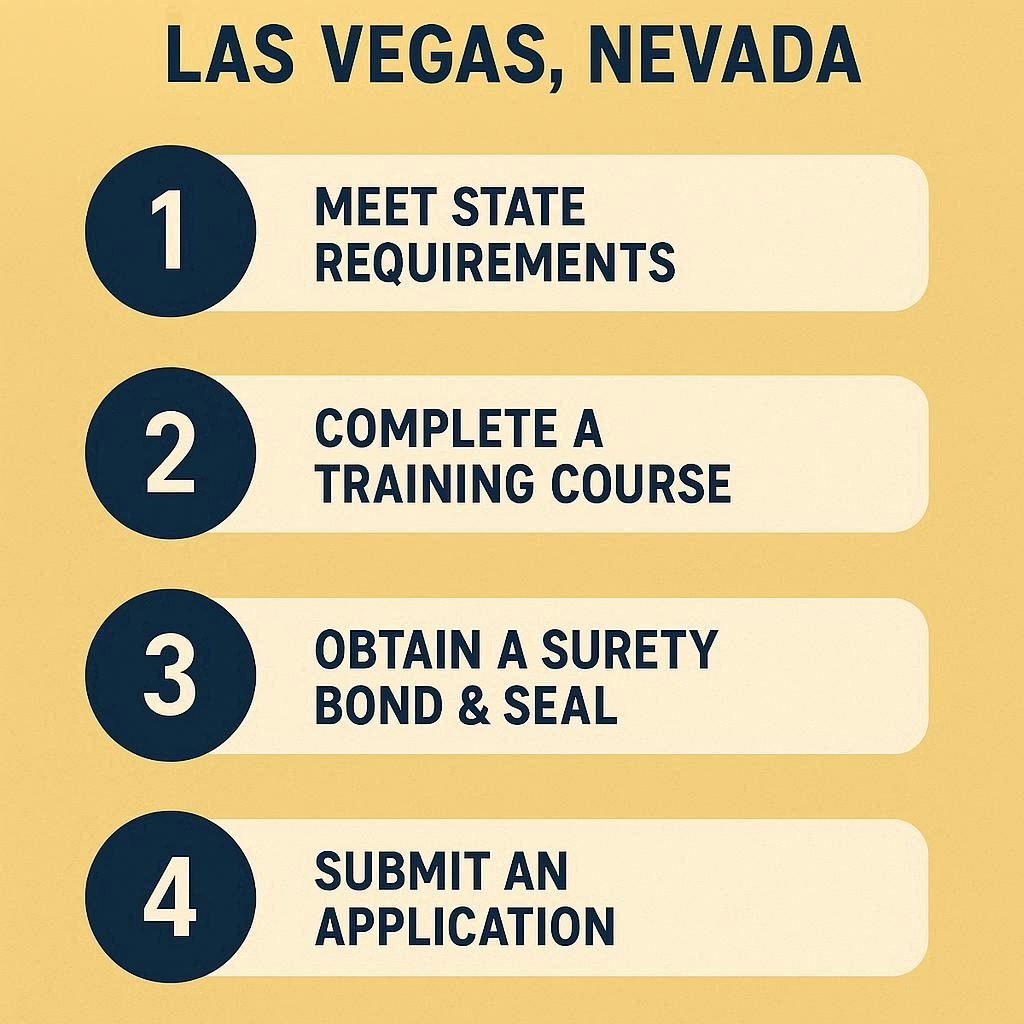What is a Notary Public?
A Notary Public is an official of integrity appointed by state government to serve the public as an impartial witness in performing a variety of official fraud-deterrent acts related to the signing of important documents. This guide provides all the necessary steps and information to earn your commission in Nevada.

Step 1: Check Your Eligibility
Before you begin the application process, you must meet several key requirements set by the state of Nevada. Ensure you qualify on all points below.
Age Requirement
You must be at least 18 years of age.
Residency
Be a resident of Nevada, or a resident of a bordering state who is regularly employed in Nevada.
Civil Rights
You must possess your civil rights. A felony conviction can disqualify you unless your rights have been restored.
Prior Commission
You must have never had a notary commission revoked in another state.
Step 2: The Application Process
Follow this interactive flowchart to understand the application journey. Click on each step to reveal detailed instructions and tips.
1. Complete State-Mandated Training
Pass the online course and exam.
2. Purchase a $10,000 Surety Bond
Obtain a bond from an authorized provider.
3. File Bond & Take Oath of Office
Visit your County Clerk's office.
4. Submit Application Online
Use the SilverFlume portal.
5. Purchase Notary Supplies
Get your official stamp and journal.
Step 3: Understand the Costs & Timeline
Becoming a notary involves several fees and costs. The chart below provides an estimated breakdown. Hover over each segment for details. The total estimated cost ranges from $200 to $270.
Total Estimated Costs
This chart visualizes the typical expenses for a 4-year notary commission in Nevada. Hover over a section to see the specific cost and description.
Estimated Timeline
Once you submit your completed application online, expect a processing time of approximately 2 to 4 weeks to receive your Certificate of Appointment from the Secretary of State.
Step 4: Maintaining Your Commission
Your Nevada Notary commission is valid for four years. Here's what you need to know about staying active and compliant.
Renewal Process
The renewal process is very similar to the initial application. You must:
- Purchase a new four-year, $10,000 surety bond.
- Retake the state-mandated training course and pass the exam.
- File your new bond with the County Clerk and get a new filing notice.
- Submit the renewal application and all required documents via the SilverFlume portal.
- Purchase a new notary stamp with your updated commission expiration date.
It's recommended to start the renewal process at least 60-90 days before your commission expires to avoid any lapse in your ability to perform notarial acts.
Frequently Asked Questions
How much can I charge for notarial services?
▶Nevada law sets maximum fees. For example, you can charge up to $15 for an acknowledgment or jurat for the first signature, and $7.50 for each additional signature on the same document. You must display a fee schedule if you charge for your services.
What is Errors & Omissions (E&O) insurance?
▶E&O insurance is optional but highly recommended. It protects you, the notary, from financial liability in case you make an unintentional error or omission during a notarization that causes a client financial harm. This is different from the surety bond, which protects the public.
Do I need to keep a journal?
▶Yes. Nevada law requires all notaries to maintain a bound journal with pre-printed page numbers to record every notarial act they perform. This journal is a critical record and must be available for public inspection.
Can I notarize documents for family members?
▶While Nevada law doesn't explicitly prohibit notarizing for family members, it's generally discouraged due to potential conflicts of interest. A notary must always be impartial, and family relationships can compromise this impartiality.